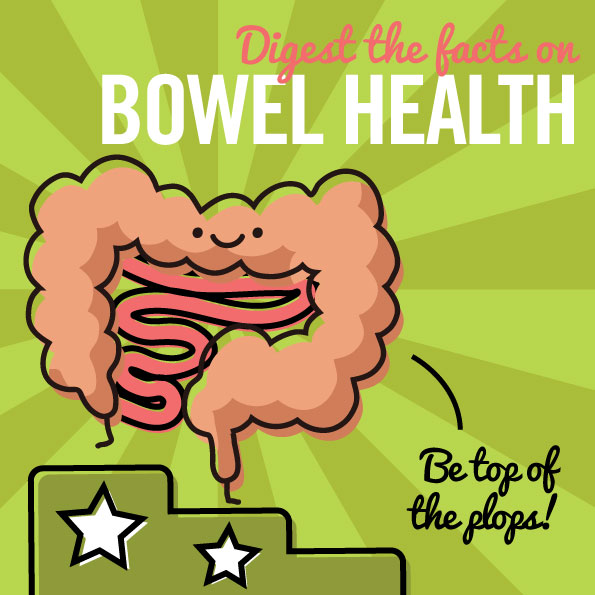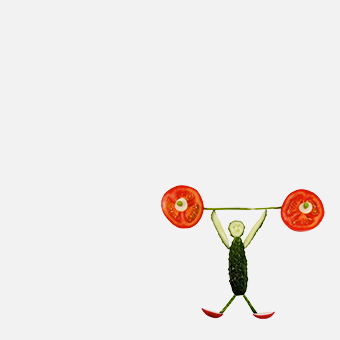It may not be the most glamorous part of the body, but with the bowel processing an average of 50 tons of food and liquid in a lifetime, it’s important to keep it in the best health. Read on to find out what the bowel does, and how we can combat any problems that might affect its functionality.
What do my bowels do?
The bowel is made up of two separate parts; the small bowel (more commonly known as the small intestine) and the large bowel (the large intestine, split into the colon and rectum). Confusing as it may sound, the small intestine is in fact longer than the large intestine, and the names are given to them based on how wide they are. In the average adult, the large intestine measures to five feet, whereas the small intestine is a whopping sixteen feet long! When we eat food and it enters the stomach, the bile produced by the liver and stored in the gallbladder helps break it down before sending it on to the small bowel. This breaks it down further, and absorbs all the nutrients and vitamins from it. It then passes through into the large bowel, first to the colon where the water is absorbed, and then to the rectum, until it is ready to leave the body.
What is IBS?
Irritable Bowel Syndrome (IBS) is caused by your colon or large intestine being oversensitive. This means that it’s harder to pass food through this area of the body. There is very little known for certain about what causes IBS, as it is difficult to diagnose unless the symptoms are present, which include stomach pain, cramps, gas, constipation or diarrhea.
Some believe that IBS could be triggered by lifestyle choices, including stress, or lack of sleep. Although it can affect people of any age, it is most common in those aged between 18 and 35, and more women than men. This is probably because of life generally being more stressful in this period of life, like university, starting work, getting married or starting a family. Have you ever been in a stressful situation and found that as a result you suffer from an upset stomach, stomach pain or simply nervous butterflies? That is because your colon is connected to your brain through nerves. This isn’t to say that if you suffer from a little stressful stomach pain that you have IBS; around one in five people have it, and it is a constant problem. If you think you might be suffering from IBS, it is best to keep a diary monitoring your symptoms for about two weeks and then consult your doctor for further assistance.
In the Unite States, April is IBS Awareness Month. Although it is incurable, there are many treatments to improve it including medication or, alternatively, dietary and lifestyle adjustments.
The big C
Although IBS may cause discomfort, there are far more serious conditions relating to your bowel that are potentially life threatening. As well as being IBS Awareness Month, March is also Bowel Cancer Awareness Month. Bowel cancer can also be referred to as colorectal, colon or rectal cancer, as this is the area where the cancer is most likely to develop. Around 700 people in the UK are diagnosed each year and with early diagnosis, over 90% of these cases are successfully treated. The Bowel Cancer UK website gives five main symptoms of bowel cancer. These are:
– Bleeding from your bottom and/or blood in your poo
– A change in bowel habit lasting 3 weeks or more, especially to looser or runny poo
– Unexplained weight loss
– Extreme tiredness for no obvious reason
– A pain or lump in your tummy
They also note that you may experience one, some, all or none of these symptoms, but most importantly of all, if you feel something isn’t right, seek medical advice and asl for a bowel cancer screening. Bowel cancer is more common in both men and women over the age of 50, and those who have a family history of the cancer. Those who have an inactive lifestyle and eat a poor diet may also be at risk.
The dirty truth about…
Yes, you’ve guessed it – we’re talking poo. Let’s face it; we all do it, and monitoring your bowel movements is the simplest way to detect whether your bowels are healthy. The Bristol stool chart was first published in 1997 to give numerical classifications to the form of human feces (to avoid embarrassment at the doctor’s too, I’m sure!). Taking to chart as a guide, here’s what you should be looking out for:

According to the scale, types 3 and 4 are both normal forms of poo, and what we should all be aiming for. If your poo is hard or comes out in small, lumpy chunks, you are suffering from constipation, and you will find it both painful and difficult to go. However, if you are finding the opposite, and your poo is running and most likely light in colour, this is inflammation, or diarrhea. Diarrhea can also be inconvenient and painful, but also dangerous in newborns and young children, as it can lead to dehydration.
How to eat for a healthy bowel
If you’re suffering on either side of this spectrum with types 1, 2, 5, 6 or 7 on the Bristol stool chart, here’s what to do to help ease your pain.
Soluble Fibre
Fibre is the most important thing to think about when considering the health of your digestive system. There are two types of fibre, soluble and insoluble, both of which help to keep you regular. Soluble fibre attracts water, meaning that excess fluid is removed from within your digestive system. By binding things all together and slowing down the digestion process, soluble fibre will help put a stop to diarrhea and the “mushy” or “liquid” consistencies described in types 6 and 7. Foods that contain these soluble fibres are beans, pea and pulses, and also fibre-rich frits and vegetables like cucumbers, carrots, citrus and berries.
Insoluble Fibre
The other type of fibre, insoluble fibre, has, as the name suggests, the opposite effect. Because these fibres do not dissolve in water, they stay solid and help move things along, speeding up your digestion. This causes a laxative effect and is therefore helpful if you are suffering from constipation like it types 1 or 2 of the Bristol stool chart. To get insoluble fibre into your diet, focus on products made of whole grains like bran, rye, and brown rice. You can also find insoluble fibre in vegetables such as beetroots, cauliflower and courgettes. People who suffer with IBS can find digestive comfort through constipation, or diarrhea, or sometimes it can alternative from one extreme to another. In these cases, eating produce like oats, flax seeds and apples would be beneficial, as they contain both insoluble and soluble fibre.
Eating clean
As well as introducing plenty of fibre, all round awareness of clean eating will help with any digestive issues. The Bowel Cancer UK charity advises eating at least five portions of fruit and vegetables every day, and avoiding processed foods, especially processed meats like bacon, ham, salami, sausages and burgers. It also suggests that consumption of red meats (beef, pork, lamb and goat) should be no more than 500g of red meat per week. Try instead to eat chicken, fish and vegetarian options.
Fluids
No matter what type of bowel discomfort you are feeling, keeping your fluid intake at a good level will aid your digestive system. Water is of course the best thing to drink, but herbal teas and fruit juices are also good choices. There are many teas on the market that are specifically designed to aid digestion, and often include chamomile, lemon balm, fennel and dandelion. Try to drink at least eight cups of water or herbal tea a day, which equates to about two litres. Alcohol can also be damaging to your bowel, so keep you this to a minimum to avoid pain.
Make time for meals
It’s not just what you’re eating but the way in which you eat which can affect your bowels. It is important not to skip meals, and to take good time when eating. Chew your food well and avoid rushing through meals.
Exercises to ease bowel discomfort
Yoga
Grab your mat! Yoga has been proven to aid bloating, stomach pains and gas, and acid reflux. It’s a win-win; yoga helps to ease your digestion, and when you feel free of bloat, you will also find yoga easier too. Yoga focuses on engaging your stomach muscles, and also focuses on breathing effectively, which will in turn relax your digestive tract. Poses that are particularly useful to practice to help your bowel stay healthy include Adho Mukha Svanasana (downward-facing dog) and triangle and bridge poses.
Walking and running
Ever heard of walking off a meal? Keeping upright and moving right after a meal will help improve the blood flow in your intestines and therefore make your whole system digest your food with more ease. Jogging and running will also do the same, but of course not straight after eating!
Core exercises
Working your core muscles will help your body to waste through your system more quickly, which is important so as to limit any complications that may happen along the way. Movements that you might want to look at are sit-ups, crunches, planks and mountain climbers.


















